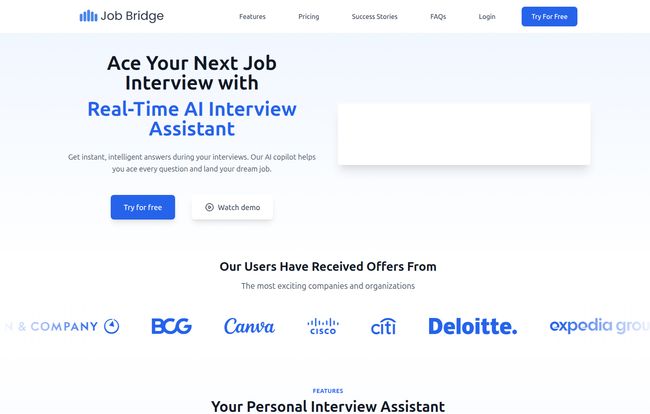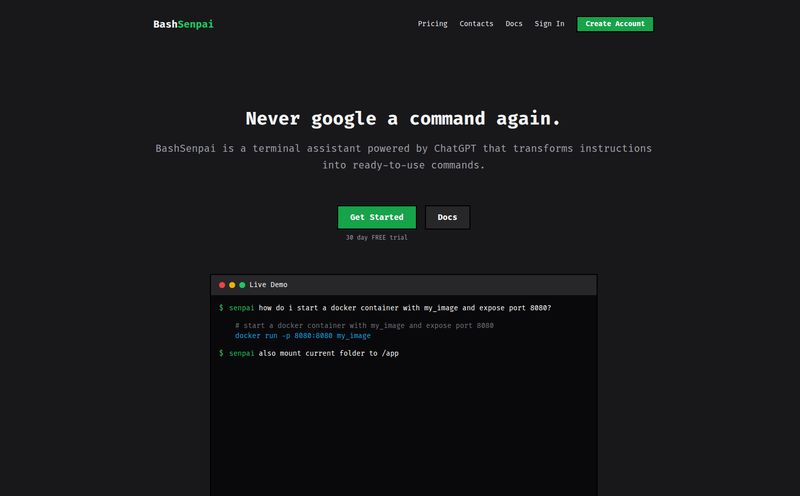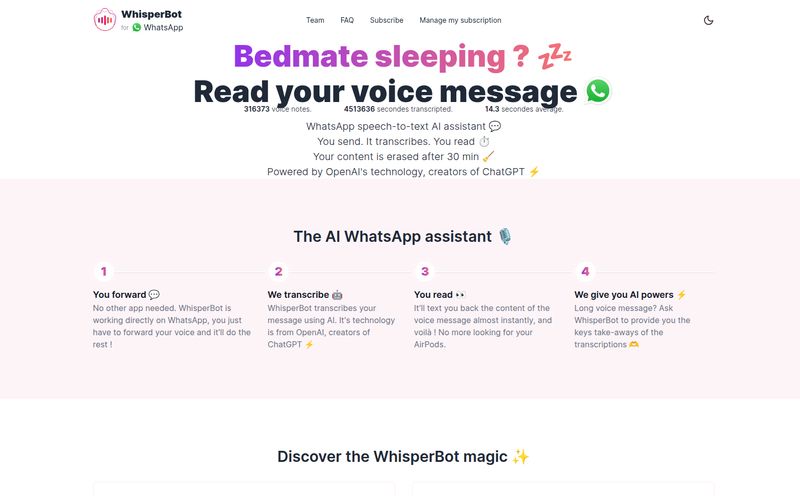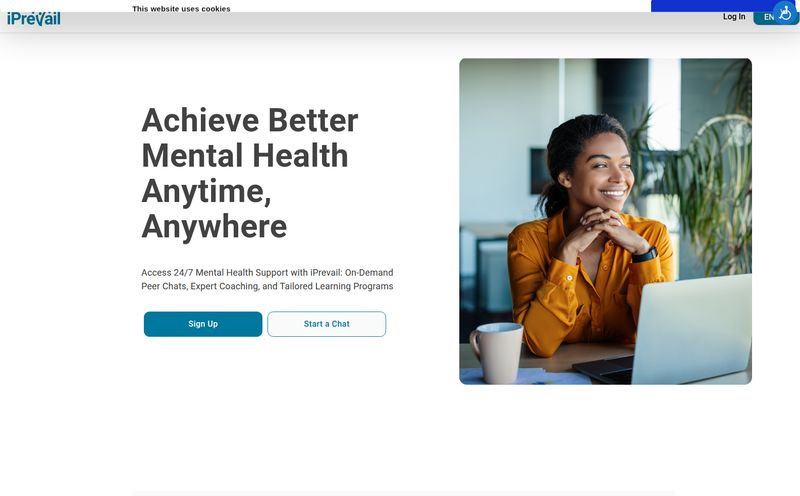Job interviews are nerve-wracking. We’ve all been there—sitting across from a hiring manager (or, more likely these days, staring at them through a Zoom window), palms sweating, mind racing. You’ve prepped for days, you know your stuff, but then they hit you with a question that just… blanks your mind. It’s that deer-in-the-headlights moment we all dread.
For years, the advice has been the same: “prepare more,” “do mock interviews,” “just be confident.” And that's all good advice! But what if technology could offer a more direct safety net? I've been hearing whispers in the SEO and tech recruiting circles about a new breed of tools, and one name kept popping up: JobBridge. It claims to be a real-time AI interview assistant. An AI copilot. Essentially, a little voice in your digital ear giving you the perfect answer, right when you need it.
Sounds like something out of a sci-fi movie, right? I was skeptical, but also incredibly curious. So, I did what I do best—I went down the rabbit hole to see if this is the future of job hunting or just another over-hyped gadget.

Visit JobBridge
So What Exactly Is This JobBridge Thing?
At its core, JobBridge is an AI-powered software that runs silently in the background during your video interviews. It listens to the questions the interviewer asks and, in real-time, feeds you contextually relevant answers and talking points on your screen. Think of it less as a teleprompter with a pre-written script and more like an incredibly smart, fast research assistant who’s working just for you, completely unseen.
The company's landing page is plastered with logos from places like Google, Deloitte, and Microsoft, with testimonials from folks who apparently used it to land jobs there. That's some heavy-hitting social proof, and it definitely caught my attention.
The Core Features That Make It Tick
I’ve seen a lot of AI tools, and most are a dime a dozen. But JobBridge has a few features that seem genuinely interesting and, dare I say, pretty clever. It’s not just about spitting back generic answers.
Your Personal, Undetectable Coach
The first question on everyone's mind is probably, "Can they tell I'm using it?" According to JobBridge, the answer is no. It's designed to be completely invisible and inaudible to the other person on the call. It doesn’t interact with the meeting software’s code or show any pop-ups. It’s a silent partner, which is frankly the only way a tool like this could ever work. The moment an interviewer suspects you're getting help, the game is over.
It’s Not Just Smart, It’s Your Smart
This is the part that I think is the real secret sauce. The pro version of JobBridge doesn't just pull from a generic database of interview questions. It asks for your resume and the job description of the role you’re applying for. It then trains its AI model on your specific experiences, skills, and the requirements of the job. This means the suggestions it gives you aren’t just random good answers; they’re tailored to you. It's like having a coach who has already memorized your entire career history and knows exactly what the hiring manager wants to hear. This contextual learning is what separates a potentially useful tool from a gimmick.
Plays Nice with (Almost) Everyone
What good is an interview tool if it doesn’t work on the platform you’re using? JobBridge seems to have this covered. Their site shows compatibility with all the big names: Zoom, Google Meet, Microsoft Teams, Webex, Slack, and a bunch of others. It also supports over 140 languages, which is a massive plus for international job seekers or those interviewing with global companies.
The Elephant in the Room: Is Using an AI Assistant Cheating?
Okay, let's just talk about it. Is this ethical? My gut reaction was a little conflicted. On one hand, it feels like getting an unfair advantage. But the more I thought about it, the more I saw the gray area. Is using Grammarly to fix your cover letter cheating? Is using a calculator for a take-home finance test cheating? We use tools to augment our abilities all the time.
In my opinion, it comes down to intent and dependency. If you use JobBridge as a crutch without knowing the material, you’ll probably be found out in the second or third round anyway. But if you use it as a safety net—a way to calm your nerves and ensure you don’t freeze up on a question you actually know the answer to—then it’s more of a confidence booster. It could be especially powerful for people with anxiety, non-native speakers who struggle with phrasing, or someone making a huge career pivot who needs help connecting their old experience to new jargon. It's a tool, and like any tool, its value and ethics depend on the user.
"The real-time assistance gave me the confidence to tackle complex technical questions. It's like having a mentor right there with you... Couldn't have landed my role at Google without it!" - Michael Chen, Software Engineer at Google (as seen on JobBridge.io)
Let's Talk Money: The Pricing Breakdown
So, what does a personal AI interview coach cost? The pricing is actually pretty straightforward, which I appreciate.
They offer a Free Plan that’s perfect for a test run. You get three 10-minute interview sessions to see how it feels. The responses are basic, but it’s enough to get a sense of the interface and the flow. Best of all, no credit card is required, so it's genuinely a free trial.
Then there's the Pro Plan. The site lists it at €19 per month when billed annually (roughly $20 USD, for my stateside readers). This is where you get the good stuff: unlimited interview sessions, the personalized AI training on your resume and the job role, advanced answers for industry-specific questions, and priority support. Honestly, if you're deep in a job search, that price is a drop in the bucket compared to the potential salary of a new job. Cancelling a couple of streaming services for a month or two could pay for a tool that lands you a dream role.
My Final Take: The Pros and Cons
After digging in, I think JobBridge is a fascinating and potentially very powerful tool for the modern job seeker. It’s a clever application of AI that addresses a very real pain point. But it’s not a magic bullet.
On the plus side, the instant and personalized support is a huge advantage. It can be an incredible confidence-booster, working silently to give you an edge. The free trial makes it a no-brainer to at least try. However, the real power is locked behind that Pro subscription. And there's the risk that relying on it too much could stop you from developing your own ability to think on your feet—a skill that’s valuable long after you’ve landed the job. The effectiveness is also only as good as the AI, which can sometimes be a mixed bag, though user testimonials suggest it's pretty solid.
Frequently Asked Questions About JobBridge
Here are some of the quick-fire questions I had, and the answers I found.
What exactly do you get in the free trial?
The free trial gives you three interview sessions, each capped at 10 minutes. This is meant to give you a feel for the tool with basic, non-personalized AI responses. It’s a good way to see if you like the workflow before committing any cash.
Is it really undetectable?
The platform is designed to run locally on your machine and doesn't inject any code or visual elements into the video call itself. From a technical standpoint, the interviewer would have no way of knowing you're running it unless your behavior gives it away (like staring off-screen constantly). So, be natural!
Which video platforms does it work with?
It’s compatible with all the major players: Google Meet, Zoom, Microsoft Teams, Skype, Webex, and more. If you're using a common platform for your interview, you should be fine.
What makes JobBridge different from other AI tools?
The biggest differentiator seems to be the personalization aspect in the Pro plan. Training the AI on your specific resume and the job description you're targeting provides much more relevant and useful suggestions than a generic answer bank would.
Can it help with technical or case-study interviews?
Yes, the Pro plan's "Advanced Responses to Industry-Specific Questions" feature is designed for this. For a software engineer facing a system design question or a consultant a case study, having structured talking points could be incredibly helpful for organizing your thoughts.
Is JobBridge Worth It?
The job market is more competitive than ever. Everyone is looking for an edge. While old-fashioned preparation is still king, a tool like JobBridge could be the ace up your sleeve that gets you over the finish line. It's not about replacing your knowledge; it's about presenting it in the best possible light, even when your nerves are shot.
If you're someone who gets interview anxiety or is trying to break into a new industry, I'd say the free trial is absolutely worth a shot. And if you're serious about your job hunt, the Pro plan's cost is a small investment for a potentially huge return. It’s a fascinating glimpse into how AI is changing yet another aspect of our professional lives.



